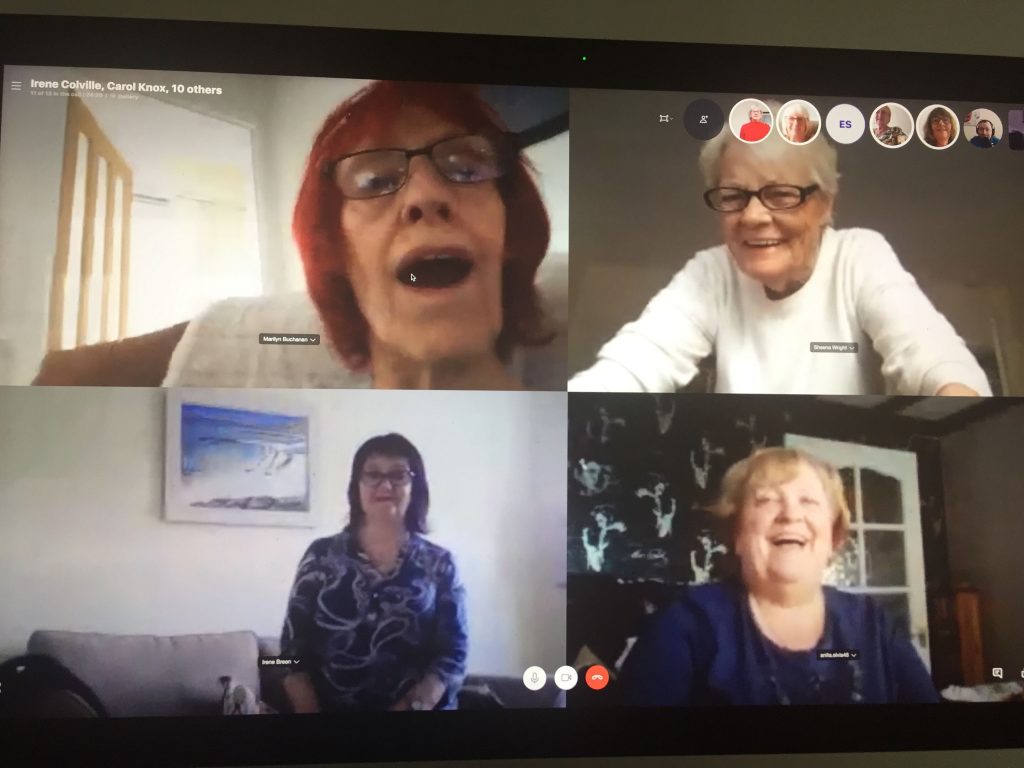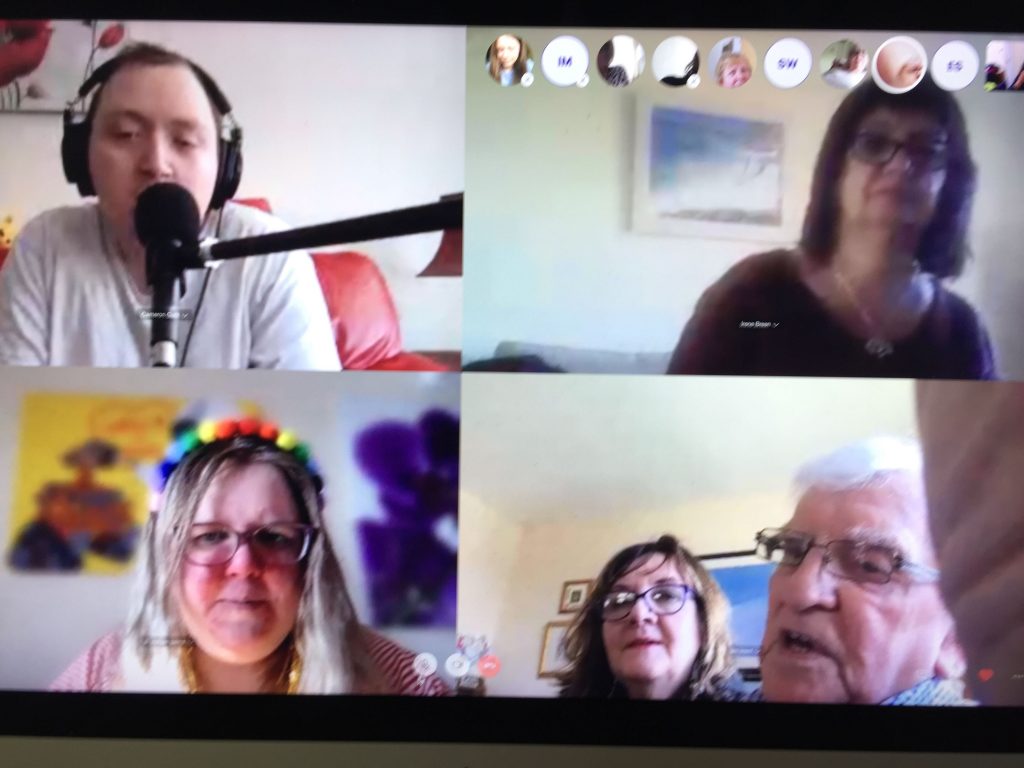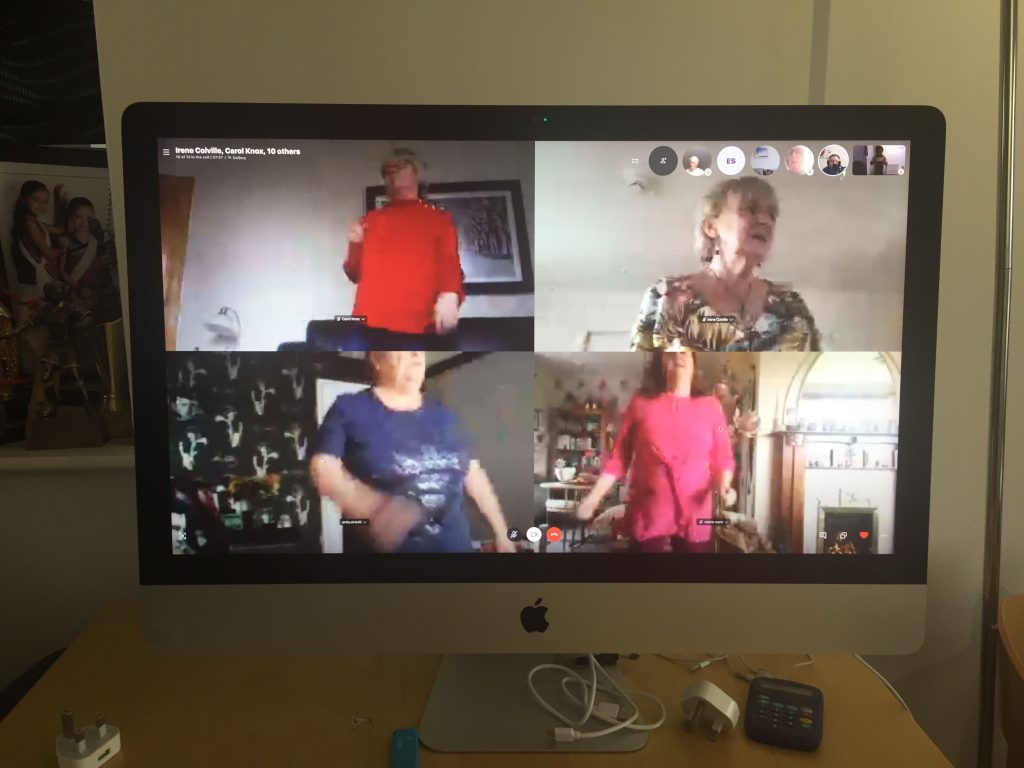Dance Like Everyone’s Watching!
How user-led service design enabled Weekday Wow Factor to develop a fun and inclusive online service very quickly
Weekday Wow Factor delivers engaging activities to add a little spice to people’s weekdays.
Their regular fun includes daytime discos in nightclubs, murder mystery lunches, zip-sliding at Go Ape and ski-lifts up mountains. Director Pasna Sallis uses her background in Occupational Therapy to adapt activities to make them fully inclusive.
They welcome adults of all ages and abilities across Greater Glasgow. Their aims are to reduce loneliness, isolation, health inequalities and ageism.
Pasna’s eyes shines when she talks about the beautiful intergenerational relationships that have been created between older adults and adults with learning disabilities; and that adults with mental health difficulties have expressed that “there is a non-judgmental vibe”.
The Challenge
Such important WOW moments in people’s lives and mutual support networks became even more important with the enforced isolation of corona. Pasna faced two huge challenges:
- How to move an active physical service online?
- How to remain accessible to a group of people with limited knowledge of technology?
Within days, they held their first virtual daytime disco! Within a week, Pasna was being featured by STV News about its huge success. Here’s how she managed it.
First find out where your clients are already online
Knowing that many clients already used WhatsApp, Pasna started there.
The first step was getting clients to press the video button to move from text chat to video chat. Then teaching them to take the phone away from their ear and hold it in front of them.
Pasna’s voice is joyous as she remembers
“The most amazing thing was people’s faces completely lighting up just being able to see each other. It was remarkable.”

WhatsApp limits four people per video call. Pasna asked the group if anyone knew Skype. Only a few had used it but most people had heard of Skype, so felt comfortable trying it. Suggesting an unknown platform would have alienated them.
Practice new skills, then practice them again
Pasna first had to teach herself to use Skype! Next 1-1 calls with clients to teach and test, then small groups, then group Skype practice every evening for a week.
More trial and error by clients as they had to work out buttons for themselves. Sometimes video worked, sometimes just sound. Even with these hiccups, everyone felt less isolated. With most people home alone, they needed to work out how to solve their own problems and develop new skills. The light-hearted atmosphere let everyone feel able to try.

Test, learn and adapt
The power of music was the inspiration for Pasna to set up her organisation. She saw how music can bring people alive, show more of the person and less of the illness. So, the daytime disco was the most important Wow she wanted to bring online.
Once the groups were Skype trained, the dancing started. Suddenly camera position became the next skill to practice. Shouts of “go back, go back, keep going back, as far away as you can” were heard.

Two new issues were identified. Skype kept cutting out and skipping parts of the music, particularly on Monday mornings; and the regular time of 11am didn’t work well in people’s new daily routines.
Pasna went back to her WhatsApp group to discuss changes. Her clients were keen to trial 5pm instead. This solved both issues, as the broadband connection seemed better and the clients preferred the 5pm slot due to their daytime activities.
Consider Health & Safety, Safeguarding and GDPR
Pasna adapted her existing forms to cover risk assessments, data collection, GDPR and people using their own devices.
One very simple document gives terms & conditions for her clients to read and sign. It asks them to
- check their surroundings for trip hazards
- be aware that their phone number will be visible in the WhatsApp group
- be aware that their name may be visible on Skype
- be aware that the software company will save their data
- give permission for photographs & videos
Keep senior leaders involved (e.g. board/trustees/senior management)
Service delivery was changing quickly and adapting daily. Pasna wanted to regularly check that her Directors and Clinical Line Manger were in agreement with service delivery changes. She needed to find a quick simple method to get information to them. WhatsApp was again the easiest platform, as they were all already on there. She could get their approval back within minutes of suggesting new ideas.
Encourage new ideas
The service has continued to develop, again with clients at the heart of suggesting new ideas.
- Introductory chat – A chat at the start of the session enables discussion of problems or worries, along with some fun highlights
- Participants choice – each person picks one tune, so the clients choose what music they want each day
- Quiz – compiling a quiz has given bored clients something to do during the day. The quick quiz each session means everyone is learning new things
Successful future and new partnerships
The past three weeks have been intense learning for Pasna and her clients. Their new online service has been a huge success. As with all stages of the development of this organisation, this success comes from its user-led service design.
The group have loved it so much that they now meet every evening on Skype and call themselves The Skypers. They feedback to Pasna how supportive and valuable it is.
Pasna loves how inclusive it is. She now has a vision that some digital service will continue after corona. She is keen that people continue to get their WOW even if they are housebound in future.
The success has attracted other organisations to offer new partnerships and collaborations.
- The Beacon Centre, Greenock, want to help add in some theatre work
- Glasgow Museums are keen to encourage reminiscing about Glasgow’s old dance halls. They will supply Old-time dancing resources and photographs.
- Lingo Flamingo want to get involved in the daily quizzes. They will offer language quizzes and discussions about past travel to other countries.
Top tips
Talking with Pasna is inspiring. She is enthusiastic about the service and humble about how she has made this all happen. Pasna’s has an amazing ability to identify what her community needs, to facilitate making that happen, and to regularly check back to ask them if it is working.
Pasna’s top tips for you are:
- Be brave
Have the courage to go for it. What is the alternative? That your service users sit on their own at home, with their thoughts and anxieties? - Experiment
Just try it. Trial & error is key. Check in with your clients. Do they think it is working? Is it what they want? Their feedback is crucial.
- Believe
Believe in your vision and believe in yourself



